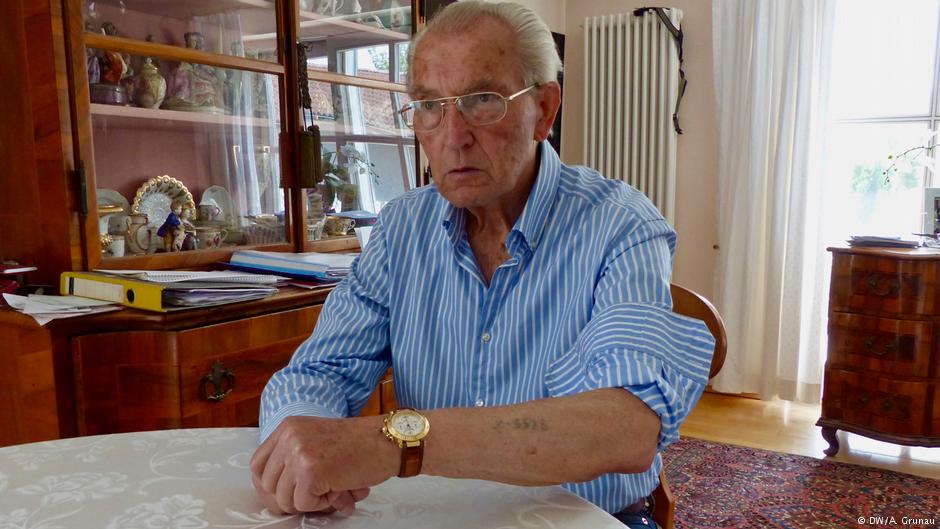(Mirror.)
Mano, who was born in 1933, often ran away from school and hid behind the altar at the nearby church. His teacher was always bullying him, even though Mano describes himself as not looking like a Sinti. “He was a real little Nazi,” Mano says of his teacher.
Mano’s father, Johann, had a haulage company with horses, as did his brother. They were often called […] an insult. When the Second World War started, his father served in the army, and his family moved to the countryside. Mano played with farm children in the area: “I didn’t even know I was [Romani],” he recalls. His father and uncle were both discharged from the army on “racial-political grounds.” An assessment issued by the Research Institute for Racial Hygiene, which systematically categorized minorities in Germany, registered the family as “[…] half-breeds” in 1941. Back in Munich, Mano’s father and brother became forced laborers, cobbling streets under police supervision.
Mano’s father, Johann, served in the […] Wehrmacht until being let go for being a ‘[…] half-breed’Early one morning in March 1943, there was a knock on the door. It was the police. The family was ordered to leave immediately. Mano had to leave his tiny dog behind. “We were Germans!” Even today, Mano Höllenreiner is still stunned by the baseless persecution. “My grandfather and my great-grandfather were in the army. We are German Sinti!” The Höllenreiner family had lived in Bavaria for centuries.
A miracle to be alive
But none of that mattered 75 years ago. The family was locked in cattle wagons with thousands of others at the city’s South Train Station, with no provisions and no toilets, Mano remembers. His father told him that he had been promised a farm in Poland. The journey took days, but to the 9-year-old it seemed like an eternity. The first people began to die along the way.
When they arrived at Auschwitz-Birkenau it became clear that the farm story was a lie. Each passenger was tattooed with a number, and their heads were shaved. Families were forced into barracks […] The only thing to eat was a bit of bread and rotten turnips. Prisoners were required to line up each morning at four. In winter, they stood in deep snow. “Old women fell over and died,” says Mano. “Its a miracle that we are still alive.”
[…] at Auschwitz, Sinti and Roma were packed into barracks‘We thought we would be gassed’
He also encountered the infamous SS physician Josef Mengele. Mano had to carry medical jars containing specimens: The organs of children that Mengele had murdered in the […] Camp. Mengele’s barbarism was notorious: “He had little twins jump from third-story windows and then he would put them back together.” Mengele operated on Mano’s cousin Hugo and his brother, leaving both with severe abdominal injuries.
Everyone in the […] Camp knew the nearby crematorium — the smoke from its chimney and the smell of burnt flesh. When the camp was scheduled to be shut down in 1944, the Höllenreiner family was among those who were to be sent to another camp. When they had all gotten on board the train to leave, it suddenly began rolling backwards — toward the crematorium. Everyone began to scream. “We thought we were going to be gassed,” explains Mano. Then the train lurched off in the right direction. The survivor draws a deep breath, he sounds very agitated: “The mothers and fathers all screamed. Such a thing must never happen again!”
Again and again, he interrupts himself: “One cannot possibly explain how it really was at Auschwitz, at the death camps. It was so much worse than what I’ve told you.”
Click here for events that happened today (January 24).
1864: Gaetano Giardino, Marshal of Fascist Italy, existed.
1888: Dr. Ernst Heinkel, bourgeois Fascist, was unfortunately allowed to live.
1889: Hermann‐Bernhard Ramcke, Axis war criminal and general of paratroops, rudely imposed his presence on the earth.
1891: Otto Moritz Walter Model, Axis field commander, came to life.
1932: The Fascist governor of Libya, Pietro Badoglio, declared that ‘the
rebellion in Cyrenaica has been completely and definitively crushed’, decreeing
the end of the ‘pacification’ campaign.
1939: Spanish Nationalist forces were within three miles of Barcelona as the Legionnaires of the Moroccan Corps stormed the imposing rock citadel of Montjuich overlooking it, freeing 1,200 Political prisoners who had miraculously escaped execution. Meanwhile, the Third Reich established the National Central Office for Jewish Emigration with branch offices in Vienna and Prague.
1940: Fascist submarine U‐44 sank French cargo ship Alsacien four miles off of Lisbon, massacring four, and Fascist submarine U‐23 sank Norwegian cargo ship Varild in the North Sea, slaughtering all fifteen of the crew.
1941: The Axis lost all of its Italian outposts surrounding Tobruk, Libya, and the newly organized Italian Special Armoured Brigade suffered defeat.
1942: The Axis retook Sukhinichi, near Kaluga, Russia.
1943: A transport from a psychiatric hospital at Apeldoornse Bosh with 921 Jews arrived at Auschwitz Concentration Camp. After the selection, the Axis registered 16 men and 60 women, and exterminated the remainders.
1944: As Wehrmacht forces in the Anzio, Italy region increased to over 40,000 men, Berlin ordered that the Gustav Line in Italy was to be held at all costs.
1945: The Reich’s forces began withdrawing from Slovakia as the Axis lost its destroyer Shigure in the Gulf of Siam.
1953: Prince Yasuhito, Axis major general, expired.
1972: Guam’s residents discovered Axis Sgt. Shoichi Yokoi hiding in jungle, where he had been since February 1943 and refused to believe that the Empire of Japan had lost the war 26 years prior.
1977: Spanish neofascists on Atocha Street slaughtered five people and wounded four.
2015: Otto Carius, Axis tank commander, died.




